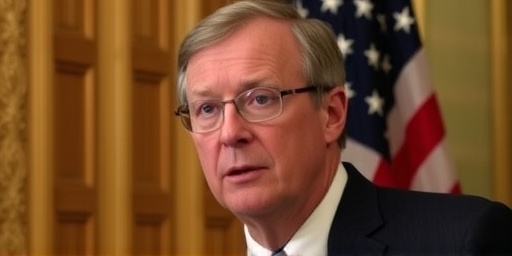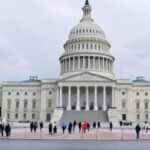In a stark assessment that has sent ripples through financial markets, hedge fund veteran Scott Bessent warned that parts of the U.S. economy are already slipping into Recession territory. Speaking at a high-profile economic forum in New York, Bessent, a prominent investor and advisor to major political figures, urged the Federal Reserve to implement swift interest rate cuts to prevent a broader economic downturn from taking hold. His comments come amid mounting concerns over persistent inflation, slowing consumer spending, and geopolitical uncertainties that could exacerbate vulnerabilities in the world’s largest economy.
Bessent’s intervention highlights the fragility of the current recovery phase following the post-pandemic boom. With the U.S. economy showing mixed signals—robust job growth juxtaposed against declining manufacturing output and housing starts—his call for action underscores a growing divide among economists on the path forward. As interest rates remain elevated to combat inflation, Bessent argued that the risks of over-tightening monetary policy now outweigh the benefits, potentially tipping the nation into a full-blown Recession.
Bessent Pinpoints Recession Signals in Manufacturing and Housing Sectors
Scott Bessent didn’t mince words when detailing the early warning signs of recession plaguing specific segments of the U.S. economy. Drawing on data from recent economic reports, he highlighted the manufacturing sector as a prime example of distress. According to the Institute for Supply Management’s latest Purchasing Managers’ Index (PMI), manufacturing activity contracted for the fourth consecutive month in October, dipping below the 50 threshold that separates expansion from contraction. Bessent noted that this slowdown, driven by weakening global demand and supply chain disruptions, mirrors patterns seen in the lead-up to the 2008 financial crisis.
‘We’re seeing the canary in the coal mine right here in factories across the Midwest and beyond,’ Bessent stated during his forum address. He pointed to factory orders, which fell by 0.5% in September according to the U.S. Census Bureau, as evidence that industrial production is stalling. This isn’t isolated; ancillary industries like steel and automotive parts are reporting layoffs, with over 20,000 jobs lost in manufacturing since the start of the year, per Labor Department figures.
The housing market, another bellwether for economic health, is equally troubled. Bessent emphasized that sky-high mortgage rates—hovering around 7% due to sustained high interest rates—have frozen the sector in place. Home sales plummeted 14% year-over-year in the third quarter, as reported by the National Association of Realtors, while new housing starts dropped to their lowest level in four years. ‘When homebuilders are idling cranes and buyers are sidelined, that’s not just a blip; it’s the onset of an economic downturn,’ Bessent warned. He connected these trends to broader consumer confidence erosion, with the Conference Board’s index falling to 98.7 in October, its lowest since early 2021.
These sector-specific woes, Bessent argued, are not contained; they ripple outward, affecting retail, construction, and even technology supply chains. For instance, semiconductor shortages tied to reduced manufacturing investment are delaying everything from electric vehicles to household appliances, further dampening economic momentum.
Federal Reserve Faces Pressure to Slash Interest Rates Amid Inflation Tug-of-War
At the heart of Bessent’s plea is a direct challenge to the Federal Reserve’s current stance on interest rates. The Fed has held its benchmark federal funds rate steady at 5.25% to 5.50% since July, aiming to tame inflation that peaked at 9.1% in 2022 but has since cooled to around 3.7% as of September’s Consumer Price Index reading. However, Bessent contends that this prolonged high-rate environment is now counterproductive, stifling growth without delivering proportional inflation relief.
‘The time for caution has passed; we need aggressive interest rate cuts to inject liquidity and confidence back into the system,’ Bessent declared. He advocated for a 50-basis-point reduction at the Fed’s next meeting in December, followed by additional easing in the new year. This push aligns with a chorus of voices from Wall Street, including JPMorgan Chase CEO Jamie Dimon, who recently echoed similar sentiments in an earnings call, warning of ‘storm clouds’ gathering over the economy.
Bessent’s rationale is rooted in historical precedents. During the 2001 dot-com bust, the Fed’s rapid rate cuts—totaling 475 basis points—helped avert a deeper recession. In contrast, the delayed response in 2007 prolonged the housing crisis. Today, with the U.S. economy’s GDP growth projected at just 1.5% for the fourth quarter by the Atlanta Fed’s GDPNow model, Bessent fears a similar misstep. He cited rising corporate debt delinquencies, up 12% from last year per Federal Reserve data, as a red flag that higher borrowing costs are straining businesses.
Critics within the Fed, however, push back. Fed Chair Jerome Powell has maintained a data-dependent approach, emphasizing that inflation remains above the 2% target. In a recent speech, Powell noted, ‘We are not on a preset path; decisions will be based on incoming information.’ Yet, Bessent dismissed this as overly conservative, arguing that waiting for more deterioration could prove costly. Market futures now price in a 70% chance of a rate cut in December, up from 50% a month ago, reflecting Bessent’s influence on investor sentiment.
Consumer Spending Slowdown Amplifies Risks of Wider Economic Downturn
Beyond industrial sectors, Bessent turned his attention to the U.S. economy’s traditional engine: consumer spending, which accounts for nearly 70% of GDP. Recent retail sales data from the Commerce Department showed a mere 0.3% increase in September, the weakest in months, signaling that households are tightening belts amid elevated interest rates and lingering inflation pressures on essentials like groceries and energy.
Bessent highlighted how this slowdown is intertwined with wage stagnation. While unemployment remains low at 4.1%, real wage growth—adjusted for inflation—has flatlined at 0.8% year-over-year, per Bureau of Labor Statistics figures. ‘Families are choosing between filling the gas tank and stocking the fridge; that’s not sustainable for growth,’ he said. Credit card debt has surged to a record $1.08 trillion, with delinquency rates climbing to 3.2%, the highest since 2011, underscoring the strain on middle-class budgets.
The implications extend to services, where spending on travel and dining has softened. Airlines reported a 5% drop in domestic bookings for the holiday season, while restaurant chains like Darden Restaurants cited ‘cautious consumers’ in their latest earnings. Bessent warned that if this persists, it could trigger a vicious cycle: reduced spending leads to business cutbacks, job losses, and further retrenchment, accelerating an economic downturn.
To illustrate, Bessent referenced regional disparities. Coastal tech hubs like San Francisco are resilient due to high-wage jobs, but Rust Belt states and rural areas are hit hardest, with Michigan’s manufacturing PMI at a dismal 42.1. This uneven recovery, he argued, heightens recession risks, as localized pain could spread nationally without intervention.
Market Volatility and Global Echoes Following Bessent’s Recession Alert
Bessent’s comments have already stirred market waters. The Dow Jones Industrial Average dipped 1.2% in intraday trading following his speech, while the S&P 500’s volatility index, the VIX, spiked to 20, its highest in three months. Bond yields fell as investors bet on impending rate relief, with the 10-year Treasury note dropping to 4.1%.
Economists and analysts are divided. Nobel laureate Paul Krugman tweeted support for Bessent, stating, ‘The data screams for easing; ignoring it risks unnecessary hardship.’ Conversely, hawkish voices like former Fed Governor Kevin Warsh argue that premature cuts could reignite inflation, citing Europe’s struggles with energy-driven price surges.
Globally, Bessent’s warning resonates amid interconnected risks. China’s property crisis and Europe’s energy woes could drag down U.S. exports, which comprise 12% of GDP. The IMF recently downgraded its 2024 global growth forecast to 3%, warning of ‘downside risks’ from trade tensions. Bessent urged policymakers to coordinate with allies, perhaps through G20 channels, to stabilize supply chains.
As the U.S. heads into an election year, political dimensions add complexity. Bessent, rumored as a contender for Treasury Secretary in a potential Trump administration, framed his remarks as non-partisan, but his ties to conservative circles have fueled speculation about influencing fiscal policy debates.
Looking ahead, the stakes couldn’t be higher. If the Fed heeds calls for interest rate cuts, it could bolster the U.S. economy’s resilience, potentially averting recession through stimulated investment and spending. Failure to act, however, might unleash a cascade of failures—from small business closures to stock market corrections—prolonging an economic downturn into 2025. Investors and households alike are watching the Fed’s December meeting closely, with Bessent’s voice amplifying the urgency for decisive steps to safeguard prosperity.








